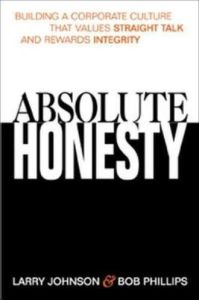Join getAbstract to access the summary!

Join getAbstract to access the summary!
Larry Johnson and Bob Phillips
Absolute Honesty
Building a Corporate Culture that Values Straight Talk and Rewards Integrity
AMACOM, 2003
What's inside?
If honesty isn’t innate in your organization, you can foster it by following six basic rules. Number 1: Tell the truth.
Recommendation
This handy guide endeavors to reduce the complex challenge of ethical leadership – with which great minds have struggled for thousands of years – to six simple and absolute rules of honesty. The authors, Larry Johnson and Bob Phillips, clearly explain each rule of absolute honesty they have derived and provide many illustrative anecdotes and examples drawn from daily life. There is a fascinating, moving story of one co-author’s unforgettable experience as a high school track star, and another account about a couple whose marriage ended in divorce after the wife insisted on acting dishonestly. Perhaps the authors believed that this volume would move even the greatest crooks to resolute and unswerving honesty. Alas, that is beyond their scope. However getAbstract.com finds that ordinary businesspeople seeking general guidelines might find useful counsel here. Hey, at least it’s a start.
Summary
About the Authors
Larry Johnson is a consultant and public speaker. Bob Phillips is a former vice president at Tektronix and Thomson Multimedia. The co-authors are partners in the consulting firm Corporate Culture Strategies.


















Comment on this summary